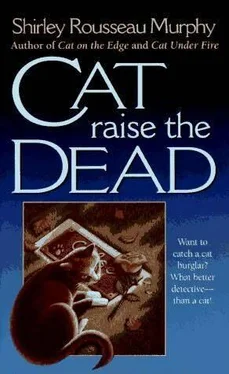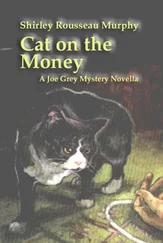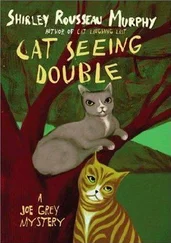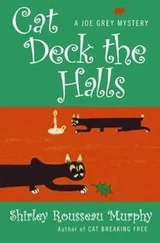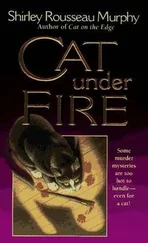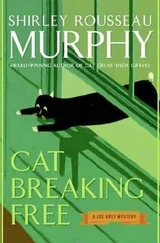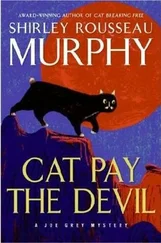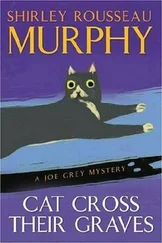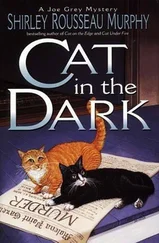Beyond the old buildings, the main house rose sharply defined, its tile roof gleaming bright red, its precision-built walls smooth and white, and its gardens and lawns neatly manicured. The hilltop estate at this moment was an island, the sea of fog lapping at its gardens and curved drive. Far away across the top of the fog, the crowns of other hills emerged: other islands, an archipelago. And the real sea, the Pacific, and the village beside it were gone, drowned in the heavy mists.
Above the estate, on the sun-drenched hill, the warm grass buzzed with busy insects, ticking away beneath the cats' paws. And as Joe and Dulcie rested, washing their ears and faces, from below came the soft cadence of Spanish music, electronically broadcast songs from somewhere within the hacienda, music plucked out of the air in a manner never dreamed possible when this hacienda was built, when the only music available came from live musicians blowing and jigging and strumming.
Three cars were parked before the old homeplace, all late-model American makes. Evidently the house staff, like the employees of Casa Capri, were well treated.
"If Adelina hires so many Spanish-speaking people," Dulcie said, "she must speak Spanish herself. How could she control someone if she didn't know what they were saying?"
Joe smiled. "Or if no one knew she spoke Spanish, she'd be ahead of them all. Could really keep them in line." He batted at a grasshopper, knocked it off its grass stem, but released it. "Whatever's going on at Casa Capri, those nurses with no English might not have a clue."
He studied the cemetery below them, off to their right, the dark, misshapen headstones set among thick old oaks. They could see the police barrier of yellow ribbon at the far side, strung around a rectangle of raw earth. Dolores Fernandez's open grave. "What makes Harper think no one will bother the grave just because he tied a ribbon around it?"
"Maybe there's a guard."
"Do you see a guard?"
She shrugged, a brief twitch of her dark tabby shoulder. "Maybe the gardener or handyman?" They could see no one on the grounds, though they could hear someone tinkering, an occasional metallic click above the radio music, coming from the direction of the old stable. Dulcie yawned, stretched, and they trotted on down into the shadowed woods of the cemetery.
The grass beneath their paws was clipped short and smooth, was as well kept as any park. It had been cleared of leaves, and was trimmed neatly around the thick oak trunks and around the old headstones. Some of the graves had sunk, forming shallow depressions. The old granite markers were deeply worn by water and wind, their crumbling edges blackened with dirt, their ornately written Spanish epitaphs dark with soil, some nearly illegible. Several headstones featured the angel of death, with hands beckoning and wings outspread. Other grave markers were carved with hollow-eyed, bony skulls. They found one happy-looking angel, a cherub-faced child with a broken nose. Farther on, two blackened angels joined hands, dirty-faced and naughty. They did not know the meaning of the epitaphs, but muere appeared twice, and Dulcie thought it meant death.
Se muere como se vivi.
No se puedo creer eso ella es muerto.
Walking softly, they approached the cordoned-off grave and trotted under the barrier of yellow police tape.
The body had been removed; only a hole remained, neatly excavated. The investigating team had not taken only bone samples, as the newspaper said.
Circling the raw earth mound, they sniffed at the shovel marks and at an occasional shoe print where the police and the forensics examiner had been working. Outside the ribbon barrier, clods of raw earth lay scattered across the grass.
They did not know precisely what they were looking for-but they were looking for anything strange, any small detail the police might have missed, but that a cat would see or smell. The grave did not smell of death; it smelled of moldering earth.
There were marks in the earth where pieces of the casket had lain, and they could see the bristle marks of a small brush, as if the excavation had been as carefully attended as an archaeological dig.
"We could dig deeper," Dulcie ventured.
"And find what? They have the bones. And don't you think they dug deeper beneath the body?" He prowled beyond the grave, nosing among tree roots, sniffing at the grass.
Once, they thought they caught Teddy's scent, but they couldn't be sure. They could find no wheel marks from Teddy's rolling chair. Quartering the cemetery, trotting over the smooth turf and protruding roots that bisected the lawn like huge arteries, they moved in a careful grid, working back and forth. Twice more they caught Teddy's scent. But it was old, faded, and mixed with the sharp perfume of grass and leaves and earth.
But then, suddenly, a powerful smell stopped them. The stink made Joe bare his teeth in a grimace of disgust, made Dulcie back away.
The smell of death, of rotting flesh.
Approaching a heap of dry oak leaves, where the smell came strongest, Dulcie froze.
"Cyanide. I smell cyanide, too." The smell made her gag and grimace. The leaves were piled against a tree, as if they had been missed by the lawn-care equipment, by the vacuum or blower or mulching mower. It was the only pile of leaves in the neatly manicured cemetery. Dulcie lifted a reluctant paw, lightly pulled away leaves, hating the cyanide smell. She had, earlier this year, been shocked to find the same deadly chemical lacing her freshly served salmon.
Now she raked angrily at the tangle, pawing it away.
Revealing, half-hidden beneath the pile of leaves, a lump of dark, raw meat.
She thought at first it was a lump of human flesh, then she saw that it was hamburger, half-rotted, a disgusting mound several days old. The combined stink of rotting meat and the almondlike smell of the cyanide forced bile into her mouth. She turned away quickly, gagged, and threw up on the grass.
Joe regarded the bait with disgust. "We can't leave that mess for a dog to find." A cat, of course, would have better sense than to go near it; no cat likes rotten meat, no cat would roll in rotten meat the way a dog does.
Holding their breath, they dug a hole deep into the sandy loam, and, by pushing a heap of leaves against the meat, they managed to paw it in. They had covered the hole with earth and leaves and had moved away where the air was fresher, were scuffing their paws in the grass to clean them, when Dulcie stared at the turf between her paws.
"There's a little crack here. Look at this. A little thin crack in the earth, under the grass."
The line was as straight as a ruler. She pressed her nose against it. "And the grass blades go in a different direction."
When they followed the line, they found another, crossing it. Pacing, they made out an even grid of crossing lines. Someone had laid sod here, piecing it so cleverly that one would never see the cracks unless one's nose was practically against them. From a human's view, they thought, the turf would seem undisturbed. Fascinated, Dulcie skinned up a tree for a look from a person's height.
Yes, from six feet up the grass stretched away smooth as velvet, a clean, unbroken turf. "No one would know. They could…" She paused, watching the hills above. "There's a rider coming. Do the Priors keep horses?"
"Harper said they don't. Remember, he sounded disgusted that Adelina would waste such a nice barn." Joe grinned. "He was really annoyed that she didn't have the place full of horses."
Horse and rider were too far away to be seen clearly, and on the crest of the hill they stopped; the rider sat his horse, looking down toward the cemetery.
"Can he see us?"
"I doubt it. And what difference?"
She studied the rider's tall, slim form, his easy seat, the tilt of his head. "I think that's Harper. Let's get out of here." She leaped out of the tree, and they moved away, going deeper among the shadowed headstones. They had just settled down where they knew they wouldn't be seen, when the roar of a motor started up, coming from the stable and heading in their direction.
Читать дальше
